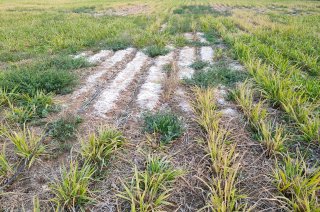
SALAD
Saline Agriculture as a Strategy to Adapt to Climate Change
Project coordinator:
Dr. Katarzyna Negacz, VU University Amsterdam, Netherlands
Partner countries:
Belgium, Egypt, Germany, Italy, Morocco, the Netherlands
https://www.saline-agriculture.com/en
Project outputs:
SALAD Policy Brief: Putting Saline Agriculture on the European Policy Agenda
Scientific abstract
Climate change impacts coastal areas by sea-level rise and more frequent droughts. These events increase the salinity in agricultural soils, affecting food systems overstretched by an increasing global population. Progressing salinisation is one of the major drivers of soil degradation in Europe and North Africa, exerting increasing pressure on conventional farming. Therefore, the inter- and transdisciplinary project SALAD (Saline AgricuLture for ADaptation) aims at improving the resilience of food production in saline and potentially saline agricultural areas in Mediterranean and the North Sea regions by:
1) supporting the development and sustainable use of innovative salt-tolerant crops,
2) identifying and further developing crop cultivation suited to saline conditions,
3) exploring and testing innovative market development techniques and instruments with the goal of upscaling crop/food chains across the regions,
4) exchanging knowledge and transferring practical and adaptive solutions among stakeholders.
Adopting a novel and innovative approach, SALAD focuses on implementing climate-smart agricultural solutions. First, we investigate prospects for upscaling production from farm to regional scale of four different crops under saline conditions: potatoes, New Zealand spinach, quinoa and tomatoes. Second, we examine business models for entrepreneurs and asset owners through comparative case analysis. The effectiveness of different approaches is compared and solution-oriented recommendations disseminated. We work with producers on practical workshops dedicated to farming under saline conditions. Further, we investigate opportunities and constraints for upscaling, including the institutional landscape of saline agriculture initiatives and involvement of investors. Finally, we explore the relevant EU and North African policies on climate change adaptation, food security and sustainability and address horizontal, diagonal and vertical upscaling of saline food systems.
Partners
Cadi Ayyad University, Marrakech, Morocco
Flanders Research Institute for Agriculture, Fisheries and Food, Melle, Belgium
Department of Earth and Environmental Sciences, KU Leuven, Heverlee, Belgium
Faculty of Agriculture, Kafrelsheikh University, Kafr El-Sheikh, Egypt
Ecological Economics, Carl von Ossietzky Universität Oldenburg, Oldenburg, Germany
University of Florence, Florence, Italy
Mohammed VI Polytechnic University, Ben Guerir, Morocco
The Salt Doctor BV, Den Burg, the Netherlands
Salt Farm Foundation, Den Burg, the Netherlands
University of Applied Sciences Van Hall Larenstein, Leeuwarden, the Netherlands
